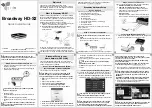
TM-D710A/E
19
6 APRS IN ACTION
While monitoring APRS stations from around the world that may appear on your map, you can
easily send messages to them. An interest is now growing in APRS QSOs where one station may
call CQ looking for responses in the conventional style of a ham contact. Due to the number of
characters being restricted, it can be customary to send short sentences using abbreviated words
similar to operating CW.
Searching for weather information can reveal that even adjacent nearby areas can have
dramatically differing weather patterns. Or operating outdoors and timing transmissions to
coincide with overhead satellite passes can result in successful satellite communications using
only a handheld transceiver. The opportunities for many activities exist even without installing a
fixed station at home.
Below are two APRS operational examples. In the U.S.A. and Canada, the national APRS
frequency is 144.390 MHz.
6.1 Let’s Go Mobile
6.1.1 Summary
First, collect and place in your vehicle the essentials necessary for operating mobile. You will
need a GPS receiver, the TM-D710A/E transceiver, an antenna and miscellaneous interconnect
cables. As you travel, you will be looking for position beacons from nearby stations so you can
enjoy exchanging messages and making voice contact.
The TM-D710A/E already includes functions for convenient mobile operation. Functions like
Frequency Display, Decay Algorithm, Proportional Pathing and SmartBeaconing are ready to use.
Decay Algorithm automatically extends the transmission interval to reduce traffic loading when the
speed information from GPS indicates vehicle movement is slower than 1 knot. One knot is equal
to 1.8 km/h, or just over 1 mile per hour. Essentially, this indicates your vehicle is parked.
Proportional pathing makes sure that local information is refreshed frequently, while at the same
time minimizing network load by transmitting less often at greater distances (number of hops).
SmartBeaconing efficiently controls the rate of beacon transmissions in relation to vehicle speed,
direction of travel and network activity. Still other functions exist to maximize messaging
convenience while driving.
6.1.1.1 Automatic Reply Function
On receipt of a message, Automatic Reply automatically acknowledges the message by returning
a preconfigured message such as: “I am QRX. Will return at 12:35.”.
Auto Reply is only for passing along special information to anticipated message senders when the
operator may temporarily not be able to respond. It should not be left on for routine operations in
most cases because it adds unnecessary network load. The sending station will always get an
ACK, and this is sufficient to know that the message was delivered in most cases.
6.1.1.2 Voice Announcement Mode
Voice Announcement mode instructs the TM-D710A/E to read aloud any message text beginning
with “%” provided the VGS-1 is installed. The VGS-1 can speak a few common ham radio words
but can spell any words by letter too.
6.1.1.3 Entering Characters
Characters can be entered using the DTMF keypad on the microphone as you would when texting
from a cell phone.
Additional details of important functions follow.
















































